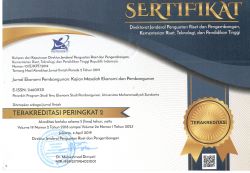DAMPAK LIBERALISASI PERDAGANGAN TERHADAP TINGKAT EMPLOYMENT DAN UPAH PADA INDUSTRIMANUFAKTUR PADAT KARYA DI INDONESIA
Joko Susanto(1*)(1) Fakultas Ekonomi Universitas Pembangunan Nasional "Veteran" Yogyakarta
(*) Corresponding Author
Abstract
In line with trade liberalization, all of trade barrier such as tariff and non-tariff barrier would be reduced. Indonesia would go into a free trade era. The objective of research is to investigate short and long run effect of trade liberalization on employment and wages of labor-intensive industries.
By regressing based on panel data, the results show that trade liberalization via tariff reducing would raise the employment and wage of labor intensive industries in the short and long run. Tariff reduction increases demand for the economy's abundant factor (labor), driving wages higher. In the long run, capital is mobile between sectors, generates the higher of capital. The higher of capital implies of an increasing marginal product of labor, driving wages higher.Keywords
Full Text:
PDFReferences
Agell, J., dan P. Lundborg, 1995. "Theories of Pay and Unemployment: Survey Evidence from Swedish Manufacturing Firm," Scandinavian Journal of Economics, 97
Arbache, Jorge Saba 2001, "Trade Liberalization and Labour Markets in Developing Countries: Theory and Evidence", Texto Para Discussao Nc 853, University of Brasilia and University of Kent at Canterbury.
Badan Pusat Statistik, Statistik Industri, Jakarta, beberapa edisi
Baltagi, Badi H., 2001. Econometric of Panel Data, Second Edition, John Wiley and Sons Ltd.
Bewley, 1997, Why Wages Don't Fall During a Recession, Harvard University Press.
Bewley, T.F., 1995, "A Depressed Labour Market as Explained by Participant", American Economic Review", 85.
Beyer, H., P. Rojas dan R. Vergara, 1999. "Trade Liberalization and Wage in Equality", Journal of Development Economics, Vol. 59.
Blinder, A., dan DD. Choi, 1990. "A Shred of Evidence on Theories of Wage Stickiness," Quarterly Journal of Economics, 105
Campbell, C, dan K. Kamlani, 1997. " The Reason for Wage Rigidity: Evidence from a Survey of Firms," Quarterly Journal of Economics, 112
Departemen Luar Negeri, 2003, Sekilas WTO, Jakarta.
Edward, 1988. "Term of Trade, Tariff and Labor Market Adjustment in Developing Countries", World Bank Economic Review, vol.2
Haouas, Ilham, M., Yagoubi dan A., Heshmati, 2002, "The Impact of Trade Liberalization on Employment and Wage in Tunisian Industries", Discus-sion Paper No. 2002/102, United Nation University.
Hsiao, C. (1986). Analysis of Panel Data, Econometric Society Monographs, No 11.
Insukindro. 1992. "Pembentukan Model dalam Penelitian Ekonomi", Jurnal Ekonomi dan Bisnis Indonesia, Vol. 7.
Kim, J. W., 1984. "CES Production Function in Manufacturing and Problems of Industrialization in LDCs", Economic Development and Cultural change, Vol.33
Lee, 1999. "Wage and Employment in China, 1980-1995: Corporatization, Market Development and Insider Force", Journal of Comparative Economy, vol.27
Levin, A. dan Lin, C. F., 1992. "Unit Root Tests in Panel Data: Asymptotic and Finite Sample Properties", Discussion Paper No. 92-93, University of California at San Diego.
Levinson, 1999. "Employment Responses to Liberalization in Chili", Journal of International Economic Vo. 27.
Markusen, R. James, J.R., Melvin, W. H Kaemdfer and K. E., Markus, 1995, "International Trade: Theory and Evidence", McGraw Hill
Poot, Hubib, A., Kuyvenhen dan J. C. Jansen, 1992, "Industrialization and Trade in Indonesia", Yogyakarta: Gadjah Mada University Press.
Robbins, D. J., 1994. "Worsening Relative Wage Dispersion in Chile During Trade Liberalization, and Its Causes: Is Supply at Fault?" Development Discussion Papers No. 484, Harvard Institute for International Development.
______. 1995, "Wage Dispersion and Trade in Colombia: an Analysis of Greater Bogota: 1876-1989" Harvard University: Harvard Institute goes International Development, mimeo.
Robbins, D. J., dan T. H Gindling, 1999. "Trade Liberalization and the Relative Wages for More-skilled Workers in Costa Rica", Review of Development Economics, vol. 3.
Setiaji, Bambang, 2001. "Sumber-sumber Perbedaan Upah antar Industri pada Tenaga kerja Produksi dan Non Produksi di Indonesia", Disertasi, UGM.
Soediyono, 1990. Tinjauan Sekilas Berbagai Sistem Devisa yang Pernah Digunakan Indonesia, Pidato Pengukuhan Guru Besar, UGM, Yogyakarta.
Wood, A. (1994), North-South Trade, Employment and Inequality, Clarendon Press: Oxford.
Article Metrics
Abstract view(s): 1009 time(s)PDF: 521 time(s)
Refbacks
- There are currently no refbacks.
















